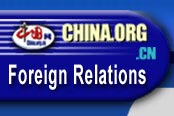Space will become the battlefield of NMD once the system currently under development is deployed, a Chinese diplomat said in Geneva Thursday.
Addressing the closing meeting of the 2000-year session of the Conference on Disarmament (CD), Chinese Ambassador Hu Xiaodi again called on the international community to negotiate now an international treaty to prevent the weaponization of and an arms race in outer space.
Refuting the argument that the development and deployment of NMD is to defend against the so-called missile threat from certain "countries of concern," Hu said that those countries are simply not in a position to pose any military threat in the foreseeable future to the militarily most powerful country in the world, given their military capacity and technology, or their overall national strength.
More importantly, the Chinese ambassador said, there is no motive for any small country to attack or threaten to attack, with intercontinental missiles that carry weapons of mass destruction ( WMD), the militarily most powerful country in the world, unless it decided to commit suicide.
"Providing such a reason for the NMD plan is not convincing at all. It is only a poorly designed excuse," he said.
At the same meeting, Russian Ambassador Vasily S. Sidorov urged the United States to preserve and comply with the 1972 Anti- Ballistic Missile (ABM) Treaty.
"We are strongly convinced that the ABM treaty remains the cornerstone of strategic stability and that it continues to serve as a basis to ensure further reductions in strategic offensive arms," Sidorov said. "We believe that this connection will be further enhanced in the overseeable future."
The Russian ambassador warned that the collapse of the ABM treaty would in effect disrupt the entire range of disarmament agreements created over the past 30 years.
Stressing that there is an increasing threat of erosion of the regimes of non-proliferation of WMD and their delivery means, Sidorov said, "The creation and development of the US NMD would give a strong impetus to the proliferation of missiles and missile technologies. There will be a shift in the positions of many countries on nuclear disarmament.
Responding to arguments of those who favor amending the ABM treaty and who justify their plans by changed strategic situation and increased missile threats, the Russian ambassador said that " we consider that references to such a threat have no serious foundation."
"Deployment of NMD is motivated by the necessity to counter strategic ballistic missiles of some countries. Meanwhile the proliferation of such ballistic missiles is not foreseen neither today, nor in the nearest future," he noted. "Changes in strategic situation, which the proponents of amending the ABM treaty are citing, can be in no way compared to those changes in strategic situation that could occur in the event if this treaty is undermined and the process of disarmament is destructed."
(Xinhua 09/22/2000)
